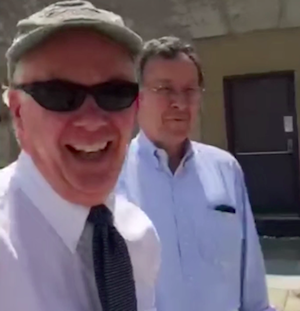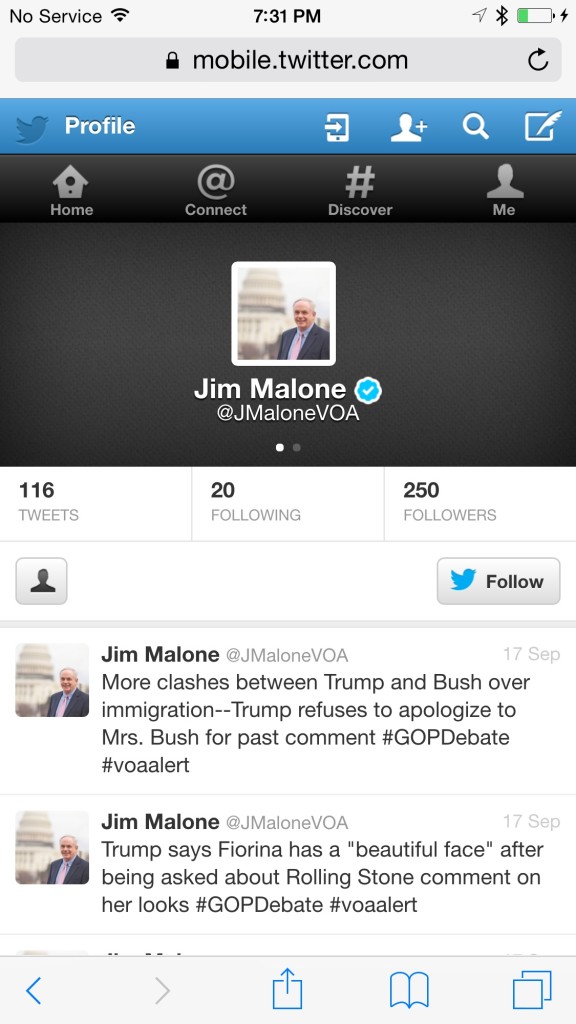BBG Watch Commentary
Voice of America (VOA) English newsroom reporters, some of whom make more than $150,000 per year in government salary alone, are not likely to be asked to “counter violent terrorism” — a concept which some of them believe might undermine their “journalistic objectivity.” A Washington Post article on similar efforts by the U.S. State Department suggests that the Obama Administration may follow experts’ advice and turn for such activities to non-U.S. Government, third-party entities.
There was in any case little chance Voice of America English Newsroom reporters would be asked to “counter” anything in the first place since most of the “countering” is done on social media and the vast majority of VOA English news reporters has by current media standards a truly minimal following on Twitter or Facebook. The main VOA English News Twitter account has four times fewer followers than the new Twitter account of Edward Snowden who has 1.3 million.
In fact, some of the strongest critics of the Voice of America getting involved with countering violent extremism still have less than a few hundred Twitter followers on their official VOA English News Twitter pages.
They are, however, making slow progress. Not too long ago, some of them had less than a hundred.
Still, at this pace it would take these Voice of America critics of countering ISIS propaganda by VOA several decades to catch up with ISIS recruiters and supporters who have thousands and tens of thousands Twitter followers and post multiple messages each day.
According to Russia’s RT, “Islamic State (IS, formerly ISIS/ISIL) … averages 90,000 messages and replies on social media every day.”
The Voice of America does not even come close.
During the weekend of the Paris terror attacks, VOA English and Russian services managed to post less than 10 Facebook posts each and got 1% of “Likes” and readers’ comments when compared against BBC, Russia’s RT and Germany’s Deutsche Welle (DW) in the same category during the same period.
A VOA manager told his staff recently that “hateful comments” on Facebook against the United States and against France after the recent terror attacks in Paris should not be removed. He admitted that VOA gets “hundreds of extremely hateful comments about homosexuality,” but pointed out that in response to anti-gay comments “we don’t shut comments down.” Compared to other international media outlets, VOA still gets very few comments from readers overall, and some of those it gets appear to be generated by trolls, pro-Putin and others.
Compared to ISIS’ massive presence on social media, the Voice of America has very little relevance in the digital age despite hundreds of millions of dollars spent on digital projects in recent years by the Broadcasting Board of Governors’ (BBG) bloated federal bureaucracy. The BBG is the federal agency in charge of VOA and other U.S. taxpayer-funded media outlets targeting foreign audiences.
 Other than lacking social media presence and impact, the other reason VOA English Newsroom reporters are not likely to be asked to counter violent extremism can be found in a review by outside experts which, according to a report published by The Washington Post, “cast new doubt on the U.S. government’s ability to serve as a credible voice against the terrorist group’s propaganda.”
Other than lacking social media presence and impact, the other reason VOA English Newsroom reporters are not likely to be asked to counter violent extremism can be found in a review by outside experts which, according to a report published by The Washington Post, “cast new doubt on the U.S. government’s ability to serve as a credible voice against the terrorist group’s propaganda.”
The Washington Post reported that the six-member panel, which included marketing experts from Silicon Valley and New York and reviewed a State Department counter-messaging program, “had serious questions about whether the U.S. government should be involved in overt messaging at all.”
“The group’s skepticism reflected concern about U.S. credibility with Muslim audiences overseas as well as the scant evidence that the State program has diminished the flow of recruits to the Islamic State, also known as ISIS and ISIL,” The Washington Post reported.
One of their main conclusions was that “it’s not the U.S. government that’s going to break the [Islamic State] brand,” the official said. “It’s going to be third parties.”
While the Washington Post article did not cover this issue, such conclusions by experts also cast doubts on ongoing vigorous attempts by the Broadcasting Board of Governors to centralize control over its various media operations and brands under one CEO. These operations include not only a federal entity such as the Voice of America, but also non-federal media entities such as Radio Free Europe / Radio Liberty (RFE/RL).
These non-federal entities appear far better suited to engage in counter-propaganda as long as they are not being perceived as being run from Washington by a giant federal bureaucracy turned into a mega propaganda agency.
Creating such a mega agency is, however, exactly what the current BBG board and its senior staff are proposing while swearing that it would not engage in propaganda but be devoted exclusively to objective news reporting.
Numerous international media, public diplomacy and counter-propaganda experts have warned against giving more power to the central BBG bureaucracy and its CEO over BBG’s non-federal media entities. These so-called non-federal grantees or “surrogate” media outlets still enjoy some limited autonomy despite continually growing interference from the BBG’s federal bureaucracy.
According to experts, these non-federal entities would be far better suited to implement counter-messaging strategies than the Voice of America.
Aware of the dysfunctional nature of the BBG’s federal bureaucracy, which Secretary of State Hillary Clinton called in 2013 “practically defunct” in fulfilling its role, members of Congress from both parties on the House Foreign Affairs Committee want to give BBG’s non-federal media outlets more autonomy and a separate oversight board.
These lawmakers, led by House Foreign Affairs Committee Chairman Rep. Ed Royce (R-CA) and Ranking Member Eliot Engel (D-NY) are being opposed on this specific reform proposal by BBG Chairman Jeff Shell and BBG CEO John Lansing.
Mr. Shell and Mr. Lansing are both highly successful private sector film and TV cable industry professionals, but they have no substantive experience in international news media, public diplomacy, foreign affairs or government operations. They are being advised by the fabulously incompetent BBG senior staff.
It is not clear whether the panel which examined the State Department’s anti-ISIS propaganda operation looked at all at VOA with its dismal social media presence.
Under Secretary of State for Public Diplomacy and Public Affairs Richard Stengel, who often represents Secretary Kerry at BBG board meetings, was quoted as saying in the Washington Post article that “We’re going to a model that involves more partnership with credible voices, with other governments and third parties.”
It does not seem likely from this comment that the U.S. Government will be asking Voice of America English Newsroom reporters who object to countering violent extremism to dirty their hands. Why would they ask a VOA reporter who has fewer than 300 Twitter followers to do anything?
But in light of the panel’s conclusions, Chairman Jeff Shell and BBG CEO John Lansing might want to reconsider their opposition to the key reform of the H.R. 2323 bipartisan bill which proposes to do exactly what experts believe works best in opposing propaganda generated by violent groups. H.R. 2323 would keep the Voice of America separate from the surrogate media outlets and might save VOA English Newsroom reporters from having to counter anything at all.

READ MORE OF THE WASHINGTON POST ARTICLE: Panel casts doubt on U.S. propaganda efforts against ISIS, By Greg Miller, The Washington Post, December 2, 2015.
###
ALSO SEE
October 12, 2015
BBG Watch Commentary
Voice of America Reporter Jim Malone Against VOA Journalists Countering Violent Extremism
[Click HERE to see video.]
Senior Voice of America (VOA) correspondents (VOA Central English News) are U.S. Government salaried employees. They are expected to provide important context and news analysis for radio, TV and Internet audiences abroad. VOA video below from this year’s VOA coverage of World War II anniversary observances in Washingtion, DC is one example of how they perform. With one or two exceptions, many VOA English News foreign correspondents and domestic reporters have hardly any social media following abroad.
Voice of America as a news organization is not doing any better in its English language news coverage, social media outreach and audience engagement. It has been mismanaged for years. Its bureaucracy has grown tremendously while VOA programs have shrunk and journalists lack resources to do their job properly.
VOA English News Twitter account has four times fewer followers than the new Twitter account of Edward Snowden who has 1.3 million. BBC News has over 18 million Twitter followers; VOA English News about 299,700. Russia’s RT Twitter account has 1.2 million followers. Many of VOA’s language services are not doing much better in terms of online audience engagement even in countries not practicing Internet censorship. VOA Russian Service Twitter account has about 187,800 Twitter followers. VOA Russian Service Facebook account has only 53,000 “Likes.”
Many senior VOA English News correspondents get very few “Likes” for their reports posted on the Voice of America website and get practically no comments from readers in contrast to BBC or RT.
That’s why the controversy over VOA and Broadcasting Board of Governors (BBG) allegedly pushing VOA reporters to engage in “messaging” and “countering” hostile propaganda seems like an artificially created issue. It distracts from VOA’s real management problems and lack of traction with English-speaking international audiences.
The Voice of America was established during World War II to counter Nazi and Japanese propaganda. It also countered Soviet propaganda during the Cold War without violating its 1976 VOA Charter. Under this law, VOA is required to present U.S. policies.
One former Voice of America staffer had this comment after reading the statement made to the Broadcasting Board of Governors by VOA senior correspondent Jim Malone:
“Reading this convinces me he is in dreamland.
The place would not even EXIST were it not for the broader objectives at the moment of helping to support policy objectives, regardless of the journalism component.”
The Voice of America is 100 percent funded by U.S. taxpayers. VOA’s annual budget is about $200 million. The agency’s budget is about $740 million. U. S. taxpayers and lawmakers who approve this funding expect that for this kind of money VOA would have some influence on foreign audiences and serve U.S. national interests. They don’t want VOA to spread false propaganda, but they want it to be effective as a source of news that indeed corrects and counters false propaganda and disinformation spread by others.
Some senior VOA correspondents are paid more than $150,000 per year in salaries in addition to other federal government employment benefits. The large ranks of VOA and agency executives are also composed of well-paid government employees. Many other VOA broadcasters, however, are poorly-paid full-time employee contractors without any basic employment benefits or employment rights protections. This is especially true in VOA foreign language services.
There seems little danger of VOA becoming a U.S. Government’s tool of spreading false propaganda. Most long-term VOA journalists, especially in VOA’s foreign language services, seem eager to counter lies and falsehoods without worrying whether this might be viewed as propaganda. They see it as what good journalists are expected to do. Countering violent extremism or Putin’s propaganda is not in their view contrary to good journalistic practice, just as exposing and countering government corruption in the United States would not bother any good American reporter. BBG’s non-federal entities, such as Radio Free Europe / Radio Liberty (RFE/RL) and Radio Free Asia (RFA), also do not believe that countering propaganda is in itself an exercise in propaganda. Some VOA English News correspondents, however, insist that the danger of VOA becoming a propaganda tool of the U.S. Government is real.
“WWII Victory Flyover Reaction” – VOA Correspondents Jim Malone and Andre Denesnera comment on the WW II Victory Flyover on the National Mall, May 8, 2015.
Jim Malone is a senior VOA English correspondent who spoke at the October 8, 2015 BBG meeting. A list of his recent reports can be seen here. Viewed in full desktop format, some of them show their Facebook and Twitter stats, as well as the number of readers’ comments. He has been with VOA since 1983. As of October 12, his Twitter account is showing 250 followers.
JIM MALONE REMARKS AT THE U.S. BROADCASTING BOARD OF GOVERNORS
(As prepared for delivery. Please check the video.)
October 8, 2015
Chairman Shell, members of the Board of Governors, CEO Lansing, ladies and gentlemen:
Good morning. My name is Jim Malone. I am a correspondent in the VOA Central Newsroom and have worked at VOA since 1983.
I’m here on behalf of many of my colleagues at VOA who are concerned about our journalistic credibility in connection with the intense focus on the policy initiative known as Countering Violent Extremism, or C-V-E.
Let me be clear. As a policy goal, I know of no one who would argue with the notion of countering violent extremism. But the growing focus on and funding of the initiative within VOA and the apparent desire to involve journalists in pursuit of a policy goal casts doubt on our independence and our journalistic integrity.
In July, senior VOA managers attended a policy retreat focused on “countering violent extremism.” Among the topics: “not every side of a story deserves repeating” and “how broadcast services could approach opportunities to undermine extremism.” How does this conform to the VOA Charter, which is public law, and the VOA Journalistic Code, which says VOA journalists “do not speak for the U.S. government,” and the International Broadcasting Act that requires the BBG board to act as a “firewall” to protect the independence and integrity of VOA journalism?
We take all aspects of the VOA Charter seriously—to be a reliable source of credible news, to represent the diversity of American thought and opinion and to present government policies as well as responsible debate on those policies. In recent months, VOA Central News and the language services have done extensive reporting on the battle against the Islamic State, including many compelling reports from the front lines.
This news focus makes it all the more imperative to keep policy advocacy separate from VOA journalism. We take heart from comments this week from our new CEO, John Lansing, who says he is committed to VOA journalists carrying out their mission according to the VOA Charter, not to act as counter-propagandists.
It was Edward R. Murrow who once said: “To be persuasive we must be believable, to be believable we must be credible, to be credible we must be truthful.”
Murrow’s picture still hangs in the VOA Newsroom, a reminder to all that our mission was, is and should remain credible journalism. Thank you.
From and editorial in the Washington Post on 6-8-14:
“VOA distinguishes itself from state services like Russia Today by embodying the democratic values of independent media and open debate. The United States will never beat China and Russia in the game of official propaganda but it can win the war of ideas, if it doesn’t lose faith in its own principles.”
From an editorial in the New York Times on 5-25-14:
“It is critical that the sponsors guarantee the American public as much as the world that standards of professional journalism will not be sacrificed in favor of a simplistic propaganda megaphone.”
The VOA Charter, which is public law, requires VOA news to be accurate, objective and comprehensive, to represent a balanced and comprehensive representation of American thought and opinion, and to present U.S. policies along with responsible discussion and opinion on those policies. That last requirement has never meant that VOA journalists actively advocate policy in their reports and broadcasts.
Under a law passed by Congress in 1998, the BBG is to act as a “firewall” between VOA journalists and the State Department to “ensure the integrity of VOA journalism.”
And the VOA Journalistic Code says VOA reporters and broadcasters must strive for accuracy and objectivity in their work. “They do not speak for the U.S. government” and they are “careful to preserve the integrity of their organization, strive for excellence and avoid imbalance or bias in their broadcasts.”
###
At the same BBG board meeting, Adam Clayton Powell III said he was not responding to Jim Malone statement, but he did provide a countervailing view.
Adam Clayton Powell III Says Responding to Untrue Propaganda Not Inconsistent With Journalism
ADAM CLAYTON POWELL III REMARKS AT THE US BROADCASTING BOARD OF GOVERNORS
(As prepared for delivery. Please check the video.)
October 8, 2015
Mr. Chairman, Governors, Director Lansing. My name is Adam Clayton Powell III, and I am President of the Public Diplomacy Council and a Senior Fellow at the University of Southern California. But this morning I speak as an individual; the views are my own and not of those or any other institution.
We read of the debate about BBG mission, the debate about how to respond to untrue propaganda, and the debate about what is and isn’t permitted under the VOA charter.
As someone who spent decades at CBS News, NPR and other news organizations, it was always the highest calling of objective journalism to speak truth to power and to spotlight misdeeds wherever they may be. It is therefore the highest calling of objective journalism to draw attention to what is by any objective test illegal and to what is antithetical to the beliefs of women and men of free will.
These are not inconsistent in any way with objective journalism; quite the reverse:
To state the obvious, not everything is true; some things are provably false. Not everything is equivalent; some things are repulsive to humanity.
Today the choice can be very clear. Seizing neighboring countries’ territory by force is not just another ideology. Shooting down civilian airliners, whether a Korean Airlines 747 or Malaysian Airlines 777, is not just another point of view. Jailing political opponents in Havana or Caracas is not just an alternative lifestyle. Mass enslavement of women and girls by ISIS is not just another way of exercising power. Mass kidnapping of African boys and forcing them to become soldiers is not just another way to govern.
These are, by any objective standard, practices which civilized people everywhere can and do condemn. These are, by any objective standard, practices that the best journalism can and should expose, to its credit. These are, by any objective standard, what America opposes.
Your challenge and your opportunity is to state this clearly and forcefully, every day, every hour.
You are the communicators of freedom, in the same tradition that 70 years ago, articulated Freedom of Speech, Freedom of Worship, Freedom from Want, and Freedom from Fear, and in the same tradition that 240 years ago, inspired communicators of freedom to write, “We hold these truths to be self-evident.”
Democracy is not just another ideology.
And freedom is not just another point of view.
Thank you for your time.
###





